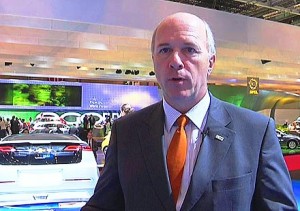
“The emotions and opinions on this topic are many," said GM Europe's President Forster.
One thing can be said about GM, if it is going down, it has finally decided it is going down fighting. GM is now using every communication, lobbying and political pressure technique available to it. This is a welcome change from the obsequiousness of GM leaders in front of egotistical — and largely clueless — American politicians at public hearings for loans.
The latest sign of a more aggressive public thrust came last Friday when GM and Opel & Vauxhall opened a website called gmeuropefactsandfiction.com. GM said it “dispels common misinformation and urban legends” about its European strategy. It also supplies “answers to questions around company structure, actions and plans.”
This appears to be a direct counter attack on the Vice-President of the European Commission, G. Verheugen, and his colleagues, N. Kroes and V. Spidla, after meeting with EC ministers in charge of the automotive industry and with representatives of General Motors, including Carl-Peter Forster, President of GM Europe.
After the meeting, Verheugen, speaking in English at an EC press conference, said with evident annoyance, “Isolated national initiatives or protectionism will not help… It is obvious that GM is discussing at regional and country levels” plans for financial help. Verheugen called for more “transparency” in the coming months and the outcome would depend on the information gathered. (The EC Competition Council will not even meet again until May.) He made it clear that the meeting was “not to prepare a rescue plan for GM.”
His public annoyance – I can only imagine what was said privately — came from an Opel supervisory board plan that was being discussed with individual European countries for the need for 3.3 billion Euros in loans to bridge what GM estimates will be a five-year period before car sales in Europe return to normal levels. GM will put in more than 3 billion Euros in commitment, including a potential third party equity source that would sell off as much as 50% of GM’s stake in Opel. GM is also facing the political nightmare of 1.2 billion Euros in structural cost reductions, which means job losses and plant closings that will take months upon months to negotiate in Europe’s fragmented political structure.

European Union bureaucrats refuse to work under the hood. They'll save the bankers, though.
‘There is not a single company in the EU in the real economy that would create the collapse of the whole economy,” said Verheugen. “Not Opel, not VW, not Siemens, not Skoda — not a single one. It would be hard and difficult, but the economy will live.”
Verheugen went on to reiterate what he has said many times, the EC priority is to prop up the financial sector since many of its failing institutions could take out the whole economy, in his view.
Why EC bureaucrats were, one, surprised that GM was going to the countries it operates in after the EC has clearly signaled that it is only interested in helping financial institutions; and, two, they are then annoyed at this rational and necessary strategy says as much as about the arrogance of European politicians, as it does about the ongoing ineffectiveness of the EC in dealing with the Great Recession.
It is also a source of increasing frustrations at the U.S. Treasury Department over what it sees as too little stimulus across the EC to encourage macro-economic growth, and from the European Investment Bank to fix the financial sector the EC says it is helping.
“The stronger the response, the quicker recovery will come. That is why the United States has passed the largest, most comprehensive recovery package in decades,” said Secretary Geithner, ahead of what was a contentious meeting this past weekend in Europe of the “Group of 20” nations, which control 85% of the world’s economy. (My friends in the UK would chide me for considering this meeting in Europe since the G20 were at a super-expensive luxury resort outside of London — ah, the joys of opining about stimulating the economy on tax dollars from the real economy.) Click here for a discussion from a Peterson Institute scholar.
Carl-Peter Forster, GM Europe President, said, “The emotions and opinions on this topic are many. No matter what your opinions are on the relationship between GM and Opel/Vauxhall, the honest answer to the question is that we’re at this juncture due to the catastrophic global economic situation we all find ourselves in. Almost every carmaker in Europe is facing historic losses while the industry navigates through markets that are off, in some cases, by as much as 50%.
“When a $40 billion operation loses a third of its sales essentially overnight, the results are not pretty. This crisis hit GM at a time when its cash reserves were low due to the extensive restructuring of the North American operations. The almost ironic part of this is that Opel/Vauxhall finds itself in this situation with arguably the strongest product-line-up in its history,” said Forster.
Enter the new website. The EC is complaining publicly about GM; GM is responding in public. The site permits sharing and social bookmarking of the content and encourages visitors to join the discussion at another web site, DrivingConversations.com, a GM Europe Executive blog.
A number of “fictions” are addressed on the site, presumably some of them opinions heard from EC leaders at meetings with GM executives. The site claims to refute, in sound bite style that:
• GM Europe/Opel-Vauxhall has no real plan for viability;
• GM has intentionally made Opel unprofitable to avoid paying taxes in Germany;
• GM sold or used as collateral Opel patents (intellectual property) as part of the U.S. loan agreements;
• The only reason that Opel/Vauxhall is not profitable is because GM has stolen from it through unfair charges for product development and other accounting tricks;
• Opel/Vauxhall is in financial problems because of GM’s North American mismanagement.
As always there is risk inherent in such a public strategy. First, the bites are spoon-sized, lacking in much detail. Second, lobbyists and Government Affairs types prefer to let their corporations take a beating of bunkum in public by grandstanding politicians, and then fixing things quietly behind the scenes. Bruising the egos of politicians makes the fixing harder and more expensive. And, in fact, GM might not be able to come up with a viable plan to save itself or Opel given the enormity of the task. Perhaps most important, the tax-paying public in every survey I’ve seen is outraged by the behavior of all institutions involved in the global meltdown, and taking the case to them can make matters worse. This is precisely the reason why the U.S. Treasury won’t reveal where the breathtaking $170 billion in taxpayer dollars to AIG actually went. (Hint: could it be the very banks and hedge funds that created the crisis, along with the Red Chinese, and governments that support terrorists?)
There is also huge risk in GM’s announcement last week that it would not need a $2 billion injection of cash from the U.S. Treasury in March. For the moment the headlines read positive; reinforcing the message that GM’s restructuring plan is taking hold and can work. But who knows how long this lasts? If GM has to go back for more money later, it will be seen as merely a publicity stunt done to secure the approval of pending loan guarantees. And its credibility, what it has left, will be gone, making further pleas, on this side of the grave, futile.
But consider the alternative – going quietly into the good night?

While the European Central government is saying it is not prepared to do anything to help Opel-Vauxhall, individual countries can do so, as long as they abide by EC competition rules.
Germany’s new Federal Minister of Economics and Technology, Dr. Karl-Theodor Freiherr zu Guttenberg, has just arrived in Washington, D.C. for what the German embassy calls “political talks.”
A meeting with Richard Wagoner, Chairman of General Motors, and other GM executives is taking place this evening.
Mr. zu Guttenberg will meet Tuesday with Timothy Geithner, Secretary of the Treasury, Larry Summers, Director of the National Economic Council, Robert Zoellick, President of the World Bank and Dominique Strauss-Kahn, President of the International Monetary Fund.
According to the embassy, the meetings will focus on the “situation of General Motors and its Subsidiary in Germany, Opel, as well as other GM Subsidiaries in Europe” and the international economic and financial crisis.
More to come from TDB, when available…
I found your blog on google and read a few of your other posts. I just added you to my Google News Reader. Keep up the good work. Look forward to reading more from you in the future.